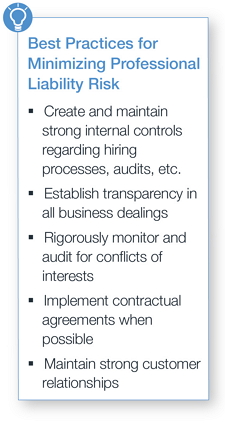Safeguard your personal assets by following these six best practices and having the right liability insurance coverage.
Excerpted from the white paper...When Your Business and Reputation are on the Line: Know Your Professional Liability Risks
Whether you work as an executive in a professional services firm, are a director or officer of a nonprofit or you own a business (or all of the above!), today’s high-net worth (HNW) individuals face greater exposure to professional liability risks than ever before.
And yet many are underinsured. Nearly 23% of HNW individuals with more than $5 million in net worth report having less than $5 million in professional liability coverage, and only 20% have umbrella coverage limits of $10 million or higher.[1] This means
that many individuals face financial exposures in excess of their current liability insurance limits.
Because even meritless lawsuits must be defended, they can threaten not only the business assets of HNW individuals, but without proper professional liability insurance, can put personal assets at risk as well. This can include a liquidation of assets beginning with savings and investments (although retirement plans and
trusts can provide some protection), followed by real estate holdings and personal property, including vacation homes and rental properties.
Because there’s no way to prevent being named in a lawsuit, ensuring that you have the right professional liability coverage and putting the following best practices in place can minimize your risk as well as the time and stress involved in a potential legal defense, should the need arise.
1. Create and maintain strong internal controls. Regardless of size of business, it's important to segregate duties, verify and hire reputable internal and third-party service providers and arrange to have financial statements audited.
2. Preserve transparency. Identify the parties involved in a particular business deal up front as well as any pre-existing conflicts before a business deal, nonprofit event or campaign.
3. Keep conflicts in check. Make sure you and the members of your organization don't have a conflict of interest in either a potential business deal or nonprofit partnership.
4. Utilize contracts when applicable. The best way to protect against claims that aren't covered under professional liability insurance is to establish clear guidelines including rights and responsibilities of all parties through contracts.
5. Build strong customer relationships. It is generally true that businesses, family offices, directors and officers and nonprofit board members that demonstrate a genuine commitment to their customers, benefactors and third-party business associates will be less likely to be named in a lawsuit.
6. Revisit insurance coverage annually. Changes to your business may change your coverage needs. Has your position in a public company changed from member to a director or officer? Have you joined any new boards lately?
Do you need
Professional Liability coverage?
What happens when your business/firm fails to meet their client’s expectations? What if a liability lawsuit is brought against you as a director or officer of a company or nonprofit, holding you personally responsible for a data breach or a bad business move? In these scenarios, you could potentially be held
responsible for any harm that “poor” performance has caused to a business or that of a third party. That’s when you’ll need professional liability coverage to kick in.
Typically sold in increments of $1 million, a professional liability insurance policy will defend you should someone find fault with your actions or services. Professional liability insurance covers only judgments, settlements and defense costs against losses arising from a covered error, omission or negligent act committed in the conduct of your business. Additional coverage, including Employment Practices Liability and or Errors and Omissions policies may be necessary.
What’s your overall
risk management strategy?
In today’s litigious world, it’s important to understand your business and personal risks, engage in best practices to limit liability and purchasing professional liability insurance. To learn more about how you can safeguard your assets and minimize your professional liability risks, read HUB’s white
paper When Your Business and Reputation
are on the Line: Know Your Professional Liability Risks.
[1] ACE Private Risk Services (March 2012). Targeting the Rich: Liability Lawsuits and the
Threat to Families with Emerging and Established Wealth.